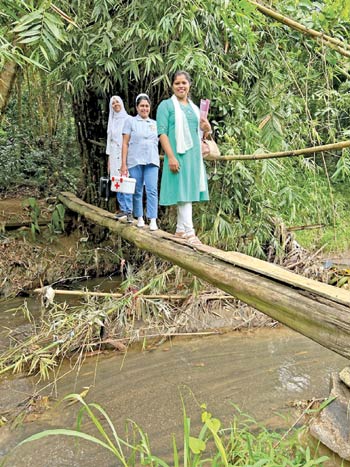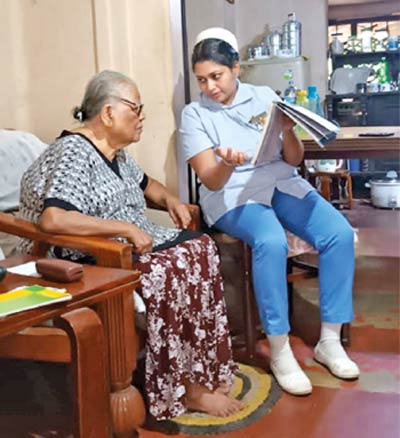Healing beyond the walls of a hospital

Crossing on narrow wooden planks on home visits
When I began my training at Katugastota Divisional Hospital, I expected a conventional clinical posting with a rotation among outpatient clinics, inpatient care and administrative duties.
Instead, I stepped into a hospital in the midst of a quiet revolution, at the centre of which was Consultant Family Physician, Dr. Lasantha Heenatigala, whose calm demeanour and soft-spoken words concealed a deep conviction. He embodied what Family Medicine stands for – holistic care that extends beyond the consultation room, guided by compassion, continuity and community connection.
In 2024, the Medical Officer-in-Charge was Dr. Hirantha Nanayakkara, with a restless drive for reform and though he had gone for training in Emergency Medicine in August 2025, the spirit he and Dr. Heenatigala ignited still illuminated the hospital corridors.
One of the first things Dr. Heenatigala asked me to do was to be a part of the hospital’s palliative home-visiting service – Suwa Sathkara Sewaya (Compassionate healing service), providing care at the doorstep for those too frail to walk into the hospital.
I joined the Public Health Nursing Officer (PHNO), Malsha Withanaarachchi, and the team of caregivers. Our hospital driver took us up winding lanes. We climbed steep steps into six very different homes, each marked by struggle as well as resilience.
We cared for a stroke survivor, a woman with advanced breast cancer, a man linked to an oxygen concentrator because of chronic lung disease, a patient recovering from spinal surgery and several frail, bedridden elders. Our interventions were both technical and tender: wound care, urinary catheter changes, nasogastric tube adjustments, IV (intravenous) drips, oxygen therapy and endless words of reassurance. The work was demanding, sometimes even physically exhausting.
Narrow pathways meant leaving the vehicle behind and climbing hillsides or squeezing through alleys. What struck me most was not the hardship, but the hospitality. Families welcomed us with tea, biscuits and gratitude that felt overwhelming. For them, it was more than medical treatment, it was an affirmation that they were not abandoned.
“It’s not easy,” Ms. Withanaarachchi confessed later. “Sometimes I climb steep steps or cross rivers on narrow wooden planks. But patients tell me their deepest fears, they trust me with their last stories.”
One story she shared has remained etched in my mind: a 64-year-old woman with womb cancer who prepared a meal for the visiting team. Her final wish was to serve lunch to those who had cared for her, before she died peacefully at home. Such acts of grace, born from suffering, revealed the profound human spirit behind palliative care.

Malsha Withanaarachchi : Public Health Nursing Officer on a home visit
Here were principles of Family Medicine in action – continuity of care including regular visits to build trust and allow long-term follow-up; comprehensiveness which included a range from wound care to emotional support, all needs being addressed; person-centredness which means that patients are seen not as ‘conditions’ but as people with families, values and stories; and community orientation in which care reaches into homes, recognizing social and cultural determinants of health.
……And palliative care matters because it provides quality of life – relief from pain and distress; home-based dignity – patients die where they feel safest, among loved ones; support for families – education, counselling and respite for caregivers; and equity in access – reaches those who cannot afford private care or long travel.
What made the Katugastota initiative remarkable was the context. A few years before, the hospital had been spoken of with disdain. However, the change came in 2024, when Dr. Heenatigala and Dr. Nanayakkara partnered with the Hospital Development Committee led by retired teacher U. Gamage and comprised businessmen and government servants including school principals.
Their approach was hands-on and personal. They landscaped the grounds, painted walls, refurbished toilets, improved waiting areas, installed televisions and PA systems and upgraded the mini-theatre. The highlight of this transformation was support to the home-visiting programme.
Each week, committee members provided their vehicles to transport staff to patients’ homes. They raised funds for essential supplies and even provided dry rations to impoverished families.
While Mr. Gamage says that they treat the hospital like a temple, where helping is an act of merit, another member Mr. Herath adds that there are no politics. The Sinhalese, Tamils and Muslims work together for the well-being of the community.
For the hospital’s doctors, nurses and minor staff, the committee’s support has been a morale booster and for patients and families, it has restored faith in their local hospital.
The transformation of Katugastota was not accidental, it was the result of the vision of the administrators and the dedication of the staff.
It reminds us that healthcare is not just about medicines or machines but about relationships, compassion and community partnership.
Today the Katugastota Divisional Hospital is a model that can easily be replicated. It also demonstrates that Family Medicine, with its principles of continuity, comprehensiveness, and person-centred care, can flourish even in resource-constrained settings. It shows that palliative care, too often neglected, can become a cornerstone of community well-being when embraced with a vision.
Most importantly, it proves that hospitals do not stand apart from their communities but live and breathe because of them.
In Mr. Gamage’s words that they want to make Katugastota the best hospital in the region, creating a healthy community by preventing disease and caring for the people, lie the essence of a quiet revolution.
Healing beyond walls, driven by compassion, community and the timeless principles of Family Medicine.
(The writer is a Senior Registrar in Family Medicine.)
Searching for an ideal partner? Find your soul mate on Hitad.lk, Sri Lanka's favourite marriage proposals page. With Hitad.lk matrimonial advertisements you have access to thousands of ads from potential suitors who are looking for someone just like you.


